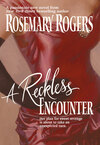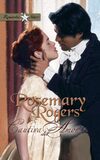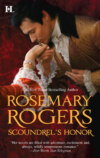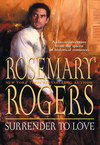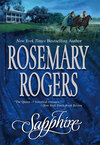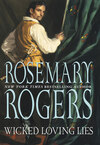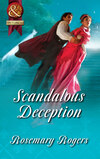Читать книгу: «A Reckless Encounter», страница 3
It was true Celia was only a child then, but she’d been old enough to recognize her mother’s torment, and old enough to vow vengeance on the man responsible.…
Now, at last, she was old enough to carry out that vengeance.…
4
“Why must you take such vulgar modes of transport, Colter? You have a perfectly lovely carriage-and-four at your disposal. It’s unseemly to travel about London in hired hacks.”
Colter leaned forward, gave his mother the customary peck on her cheek. She smelled of lavender, a familiar, powdery fragrance he always associated with her. He straightened, a dark brow cocked.
“You make it sound as if I arrived in the butcher’s cart.”
“You might as well have.” Lady Moreland flicked an elegant hand at the maid to indicate where she wished her breakfast tray set. When the servant had gone, she turned to regard her son with an arched brow. “I’m pleased you found time to visit me. I began to wonder if I had offended you in some way.”
Colter braced one arm atop the mantel where a cheery fire burned behind brass firedogs. “You know why I don’t come more often.”
“Yes. I do.” She perched daintily upon an upholstered settee, still youthful and graceful despite her years. “Your father has inquired about you.”
“Has he.” Colter shifted restlessly. “Why?”
“Can a father not inquire about his son without undue suspicion?”
“Other fathers, perhaps. Not mine.” Colter moved past his mother to stare out the window into the gardens below. Stone statuary graced fading flower beds, and a fountain trickled cold water from a jug held by a Grecian goddess. Venus, he thought, though Attila the Hun would be more appropriate for the Moreland garden.
“Really, Colter,” his mother said behind him. “You should make more effort to compromise.”
He turned to face her. Thin sunlight streamed through the windows, creating an aura around Lady Moreland that was almost ethereal. She resembled an elegant stone angel, save for the faint lines of strain that fanned from the corners of her eyes. Her hand shook slightly as she poured hot chocolate into a cup; rich aromatic steam rose in wispy tendrils. She didn’t look at him, her attention focused upon the silver tray laden with biscuits, cake and serving ware.
He scowled at her obvious tension.
“What has he been on at you about? Don’t deny it. You can’t even look at me. Christ above, what tear is he on now that he’s upset you?”
Anger edged his words, made them hard and brittle so that his mother set down the china pot and folded her hands in her lap before she looked up at him.
“It’s that business with the East India company. The new docks that he’s financing have gone beyond the budget, and he’s convinced that his uncle is involved in a scheme to ruin him.”
“Given Philip’s propensity for idleness, I find that accusation unlikely.” Colter shrugged when his mother made a small sound of dismay. “You must admit all the animosity seems to come from my father. While Philip may resent the fact that my father inherited when fever took the first heir, he hides it well enough. And he’s too bloody lazy to scheme.”
“You shouldn’t talk about your great-uncle that way. Or your father, for that matter. Really, whatever has gotten into you lately? You were once quite pleasant. Now—”
“Now I’m the reckless Lord Northington, heir to a title and my father’s reputation. I can no longer afford to be pleasant. If Grandfather had only lived awhile longer, perhaps we could have all been set free. It was a damned nuisance that he contracted a fever and shared it with the only heir capable of decency. My father’s lucky star again, that he inherited after all.”
The countess looked distressed, and Colter cursed his harsh tongue. The same fever that had taken the sixth earl and an uncle had also taken his older brother Anthony, the heir, an unexpected death his mother still deeply mourned and his father cursed.
He crossed the small sitting room and sat beside his mother on the striped brocade settee in front of the fire.
“I’m in a wicked mood, ma mére. It has nothing to do with you. I’ll go up and see him before I leave. I always do, don’t I?”
“Yes.” Blue eyes not quite as bright as his stared at him with a searching penetration. “You always do your duty. You’re an honorable man.”
“Don’t let that get about. I want nothing to sully my reputation as a scoundrel and a rake, if you don’t mind. It’s much more convenient to have anxious mamas avoid me rather than push their horse-faced daughters in my direction.”
A faint smile touched the corners of her lips. “Not even your sullied reputation will divert some, I’m afraid. Your presence at a fête has been requested by one of my dearest friends, and I trust you won’t disappoint me.”
Colter lifted an ironic brow. “How grim.”
“Just make an appearance. You aren’t required to stay long.”
“Which of your friends is ruining my evening with a room filled with chattering ninnies, may I ask? Or do you intend to surprise me—God, it’s not Lady Throgmorton, I trust.”
“No, not even I would be so cruel as to make that demand of you. It’s Lady Leverton. She’s been my dear friend for some time. Her daughter was just presented to the prince and is to be wed next summer, but apparently wishes to enjoy the small Season. She also mentioned that her cousin’s daughter from the Colonies will be presented. A charming girl, I understand. Quiet, and not prone to giggling or stammering. I find that refreshing these days.”
Colter thought of Harvey and the young woman who had accompanied Lady Leverton. He was wrong. London was small enough for coincidences, after all.
And it couldn’t have come at a more perfect time.
“Since you ask it of me,” he said, and saw his mother’s surprise, “I’ll let you fling me to the wolves. Just don’t expect me to linger for the coup de grace.”
“Really, Colter.”
“Ah, now I’ve earned your reproach. I should offer my apologies to you.”
“Yes, you should. But all will be forgiven if you pay particular attention to Lady Leverton’s cousin. I’ve been assured she has excellent manners. Be charming enough to assure her success, but do not be too charming. No sense in giving the wrong impression to either the young lady or to Lady Leverton.”
“Now I see your plot. You’re a disgraceful schemer, and should be ashamed, but I see that you have no scruples at all. You know I hate to be charming.”
“But you do it so effortlessly when you choose.” Her smile was serene. “You surprise me, Colter. I thought it would take much more to wring an agreement from you.”
“You know I’ve never been able to refuse anything you ask of me.”
“Then I ask that you be agreeable to your father. Ah. I see that doesn’t get an immediate response from you. Are you more able to refuse me now?”
“Let’s just say I’d rather clean the Aegean stables. It would be less messy, and far more successful.”
Unperturbed by his observation, she said, “Excellent. Now, be so good as to visit your father before he sends Brewster down to fetch you. He’s already in a rare mood. Try not to quarrel with him.”
Rising to his feet, Colter regarded his mother for a brief moment. She sat erect as she always did, her bearing innately aristocratic. It was a posture he had come to associate with times of duress, an indication that the earl was behaving toward her with more than just his usual perversity. He bent over the hand she held out to him.
“I’ll visit the dragon, but I make no promises. He can hire whipping boys. I refuse to be one.”
“Just—” She paused, then said softly, “Just try to remember his illness.”
“His illness has little to do with his nature. If you prefer to forget that, I choose to remember.”
The countess said nothing, but her eyes held a sorrowful recognition of the truth. He felt like a bloody bastard reminding her of it.
The earl was irascible as always, made even more petulant by his chafing against the infirmity that kept him confined to his chamber most of the time. His valet, Brewster, hovered nearby, tending him solicitously despite the old man’s impatience.
“It’s about time you had the decency to answer my summons,” Moreland growled, glaring at Colter from beneath a heavy shelf of brow. “You’ve become damned insolent.”
“Yes. Is there something specific you wished to speak with me about?”
Moreland’s glare held evidence of his old vigor, but his hand shook as he gripped the coverlet over his legs with a knotted fist. “It may interest you to learn that one of our ships is apparently lost at sea with a valuable cargo. Or perhaps your business acumen isn’t sharp enough to understand what that means to our financial interests.”
The earl glared up at him, his insult left hanging in the air. Colter shrugged.
“No, probably not. Will it affect my inheritance?”
The earl’s jaw clenched; a muscle leaped beneath his pitted skin. “It should have been you who died instead of Anthony. He was a fitting heir, with a true sense of his heritage. Damn you, you’re your mother’s son—a weakling, a profligate without proper appreciation for the Moreland heritage!”
“Yes, I certainly agree with that. Tony should have been your heir. He aspired to your legacy, after all, while I prefer my amusements to be willing.”
Colter’s gaze was riveted on his father, but he heard the soft click of the closing door that indicated Brewster had deemed it wise not to be privy to this particular conversation. The valet was noted for his discretion, a wise habit that had kept him in the earl’s employ for the past twenty years.
“I never know what the bloody hell you’re talking about these days,” Moreland snapped. The bank of windows behind him filtered light that softened the earl’s sagging features but not his harsh tone. “You make these obscure remarks that are completely incomprehensible.”
“Yes, so it seems. Do you refer to the India, by any chance? It is reported to have gone down off the islands near Lubang. She was carrying a full cargo of spices and specie, according to my sources.”
Moreland snorted. “Which we can ill afford to lose. As you are a major shareholder in the company, and now the family representative, you must meet with the board. A cursed business. First, the docks have gone beyond budget and now this! We have creditors who’ll want an explanation for the ship’s loss.”
“No doubt. The obvious explanation will certainly not suffice. I presume Leatherwood has the ship’s manifests and budget reports I’ll need.”
“Yes. Placate the board, Northington. We must have time to recover from this loss. We can’t risk losing investors. It would cause far too many complications.” The earl squinted up at his son, his mouth set in a bitter slash. “I’ve often wondered if my father somehow knew the trouble it would cause me to have you on the board. If he’d only left me those crucial shares…”
As the earl’s voice trailed into silence, Colter reflected that his grandfather had certainly known what he was doing. The former earl had done what he could to curtail his heir’s access to the family fortune. As no doubt the present earl would continue to do to his own heir.
“Do not,” the earl added tersely, “speak of this to my uncle. The less Philip knows at the moment, the better I like it.”
“I wasn’t aware Philip was involved.”
“He’s not. Or shouldn’t be. But curse him, he manages to find out about my business affairs far too often, and I don’t trust him.”
“Such familial devotion,” Colter observed dryly.
“No more so than he’s exhibited for me. He has always thought the title should belong to him upon the death of my grandfather. ‘The younger son should inherit his father’s estate, not the grandson,’ he said. Rubbish!”
“So you claim, yet I’ve never heard a word spoken about it from Philip. He seems quite content with his inheritance. He enjoys being an idle gentleman.”
Moreland snorted. “Don’t be fooled by his pretense of complacence. You consider me ruthless, but I assure you that my uncle has refined the art.”
Colter didn’t reply. There had always been rivalry between the two men, and though Philip Worth—Lord Easton—may indeed be the epitome of a wastrel, Colter had never known him to act with any malice.
Unlike his father, who had acted with malice too many times to count.
The earl flapped a hand at his son, an indication he was being dismissed. Brewster returned to tend him, a silent, efficient valet fussing over the blanket draped over the earl as if there was no one else in the room, as if Colter had already departed.
He left the house without seeing his mother again, his boots echoing in the wide, empty cavern of the entrance hall, the gleaming black-and-white marble floors spotless and sterile. The quiet peace of the house was deceptive. Beneath the facade of serenity lurked a cesspool of anger and corruption. The earl thrived on it. Until his illness, he had instigated scandal and schemes without a shred of restraint. Only his wealth and title had saved him from ruin.
It fell to his son and heir—the unwanted heir—to walk a fine line between his father’s tainted reputation and the necessity of maintaining the facade without being tarnished by the same brush. Publicly he would not denounce his father, but privately, he did all he could to show his contempt for the man the earl had become. It had become a game of sorts between them. A serious game in which winner took all.
Christ, it was just as bitter a regret for him as for his father that Anthony had died from that fever. There were times he felt trapped, imprisoned and raging against the invisible bars of his cell.
He welcomed strife, welcomed a challenge, welcomed anything that would distract him. Why not? It was better than the reality of his situation, the trap that closed in around him a little more every day.
It wasn’t the mechanics entailed in the myriad technicalities of a vast shipping business that he found stifling, for that could be energizing if he was left to his own devices and decisions. But it was intolerable to be in the position of having his every decision supervised and examined as if he was still a schoolboy at Eton.
If not for his mother, he would have damned the title and the money and left long ago, taken the Grand Tour that Napoleon had denied him until His Majesty’s invitation to lead an army against the Corsican. It was not as he had first envisioned touring the Continent, with the smell of gunpowder and stench of death in his nostrils, the screams of dying men drowning out everything but the instinct to survive. He had learned the art of killing, refined it, then been sent home to be civilized once the war ended.
It was difficult. Acquired savagery still surfaced at times, still seethed beneath the thin veneer of civility. So he’d left England for a while, traveled, seen places in the world that were exotic and dangerous. He’d gone to South America, Spanish California and New Orleans in the American South, and when he’d come home at last, it was to find his entire life irrevocably changed.
Had he remained in England, he would probably have died of the same fever that had killed his brother. It was an ironic twist of fate that he’d survived legions of French while Anthony—the heir, the golden son—had died at home in his bed.
There were times Colter almost envied him.
5
Light from thousands of candles and wall sconces illuminated the vast ballroom. Glittering jewels sparkled on bare bosoms and elegant coiffures. Music soared above the chatter and laughter of hundreds of guests, linen-draped tables lined walls and potted plants cast feathery shadows on polished floors. Celia scarcely recognized her cousin’s ballroom. It exceeded her childhood dreams.
It had seemed immense when vacant, but now the ballroom had shrunk to a suffocating constriction of space. For a brief moment, she was slightly panicked. How had she ever thought for a single instant that she could manage this? She was out of her depths here among these people far too accustomed to the trappings of wealth and polite society. Since arriving in London she had realized how far apart her world was from this glittering society. The chasm was wide. Almost too wide.
Nervously she ran a swift hand over the skirts of her new gown, the satin and tulle embroidered with tiny gold stars and ending in a graceful train. It was caught just beneath her breasts with a wide sash also embroidered with gold stars upon lush blue velvet. Matching slippers were adorned with stars sewn in glittering gold threads. The only concession to the cool night was a silk shawl of sheer white, spangled with more gold stars.
Lily had dressed her hair, piling it in luxuriant curls atop her crown and allowing artful tendrils to fall over her forehead, temples and neck. A wreath of gold stars was placed upon her brow, with a matching piece that was attached to the comb securing her curls.
“It is the a` l’enfant style,” Lily said, gazing at her with approval when Celia had stared at her reflection in the mirror. “Ravissante!”
Astonished at the transformation, Celia hadn’t even heard Jacqueline come into the room until she came up behind her, saying with delight, “How beautiful you are, petite. But you should hurry, for we must form the receiving line.”
“I…I’ll be down very soon, I promise,” she’d said, and saw that Jacqueline understood.
The light hand on her shoulder squeezed tightly. “You will be quite the thing tonight. No one will be able resist not only your beauty, but your sweet charm. Just be yourself, and all will be well.”
But would it? Celia thought distractedly that if Jacqueline knew the truth she would not be so certain of success. There were moments she considered leaving rather than disappointing her cousin, but still she stayed. She must face Northington again, must see for herself the man who had brought so much pain into her life. She could never be free until he paid for his injustice.
Now that the moment was here, she wavered between anticipation and stark fear. Yet the face in her mirror looked composed, showed nothing of her inner turmoil.
At last she took the wide, curved staircase to the ballroom on the second floor. She waited, heart thumping an erratic rhythm. It was so crowded, a whirl of men in evening breeches and elegant coats, a glitter of jewels and flashing smiles in a sea of strange faces.
Finally she spied Jacqueline in the receiving line. She was in her element, laughing gaily, reveling in the success of her first ball of the Season. The guest list included most of the upper strata of society, and quite a few were in attendance. Ladies Jersey and Cowper formed a gracious quartet with Jacqueline and Carolyn. Celia knew them by reputation only. The formidable ladies could ruin a young lady’s aspirations with a simple rejection to the inclusion of Almacks, their vaunted club, and it was the single-minded goal of many London mamas to have their daughters accepted into that desired society.
Celia had no illusions about her future. Yet her desire to please Jacqueline made her dutifully agree to all the preparations. It was necessary to feign interest in a suitable marriage in order to achieve her true goal.
Oh, but she truly felt guilty over the subterfuge. Jacqueline was far too kind and loving to be duped in this manner, and several times Celia had hovered on the verge of confession. Only the memories of Maman’s tragic death and the man responsible kept her still silent.
And now she would once more face Lord Northington. Fingers gripped her ivory fan so tightly it crackled a protest, and she relaxed before it broke.
I must remain calm. It is the moment I’ve waited for all these years.…
Would Northington recognize her? Remember the little girl whose mother he had killed as surely as if he had plunged a dagger into her heart?
“Celia dear,” Jacqueline beckoned, a gloved hand urging her forward. “Come and meet Lady Jersey and Lady Cowper.”
Pasting a smile on her face, Celia moved forward to greet the two formidable grande dames of London society. Oh, she thought in surprise when they greeted her quite graciously, they are very pleasant. Perhaps it is just their reputations that are intimidating, though they are assessing me quite openly.
“Will you remain long in our fair city?” Lady Jersey inquired, her lace-and-ivory fan wafting a slight breeze over elegant features as she gazed at Celia. “Lady Leverton informs me that you’ve only recently arrived from the Colonies.”
“Yes. I’m not at all certain how long I’ll remain in London. I suppose that depends upon the kindness of my godmother and her husband. Lady Leverton has been far too good to me, and I’m truly enjoying London sights.”
Emily Cowper leaned forward, fascination evident in her round face. Rumored to be the most accommodating of Almack’s patronesses, she seemed genuinely interested in the American colonies. “Tell me, how does our city compare to the Colonies? Is it true that wild savages roam the streets of cities in America, or is that only one of those ridiculous rumors that so often abound?”
Celia snagged a glass of champagne punch from the tray carried by a passing footman, and smiled brightly over the rim.
“As it happens, it’s partially true. On occasion the natives have been known to visit the city, but for the most part, they prefer their own company. Can you blame them? However, it wasn’t so long ago that uprisings and massacres indeed were visited upon American cities. The retaliation was quite harsh.”
“Ah, I do not understand this American penchant for hostility,” Lady Jersey remarked, blithely ignoring the recent war with France. She flicked her fingers in the air to indicate contempt. “One would think they would be too busy rebuilding their primitive capital to even consider retaliation upon savages.”
Celia delicately refrained from mentioning that it had been British soldiers who had burned Washington and the Capitol before ravaging the countryside only five years before. She said instead, “There are hostile tribes of natives still inhabiting the wilderness, but they remain distant for the most part.”
“How terrifying!” Lady Cowper gave a delicious shiver. “I cannot imagine such a horrid fate. All those brown men running about half-naked and abducting females—they have been known to do that, no?”
Celia nodded. “It has happened.”
“How terrible! I’m so glad I live where it’s quite civilized.”
“You wouldn’t think it so civilized if you were to walk past St. Giles Cathedral,” Lady Jersey said dryly. “All those wretched women hanging about, and even the children ready to cut your purse—or throat—without blinking.…”
As the conversation turned to other subjects, Lady Cowper’s gaze drifted across the ballroom and her brow shot up. “Oh my, do look who has arrived!”
Turning, Jacqueline gave a small gasp of delight. “It is Northington!”
A chill shivered down Celia’s spine, and she could not at once bring herself to turn and look at the man who had destroyed her childhood. She emptied her champagne and gave the glass to a footman. Her fingers tightened on the bone handle of her fan. She waved it idly back and forth, rigidly waiting. Hairs on the back of her neck tightened; it felt as if the careful cluster of artfully arranged curls on her crown were standing erect.
Lady Jersey said, “He arrives late, and does not even acknowledge the receiving line. Is that Sir John Harvey with him? Perhaps I missed his name on the guest list…”
Jacqueline’s chin lifted slightly at the implication, and though her mouth was smiling, there was a glint in her eyes. “I don’t turn away pleasant company. Harvey’s father is a baron, and Sir John I find quite charming.”
“Yes, perhaps. His father is a member of the Carlton House set and quite fast, you know. A gambler, as is his son, but neither is as proficient as Northington.”
“Neither man has the best reputation,” Lady Cowper said with a flutter of her fan, and her eyes held a speculative glow. “Yet he is so attractive, for all that he seems so…well, dangerous, I suppose you could say.”
Lady Jersey lifted her lorgnette to gaze across the room. “You must mean Northington. A handsome man, and yes, so dangerous. Quite the rogue, they say. Very adept with the pistol and the sword, and has been known to walk away from several duels, though of course, that’s still frowned upon these days. How many commendations did he receive for his military service?”
A gleam of naked excitement brightened Lady Cowper’s eyes. “One commendation was awarded for Northington’s courage in leading a charge against Napoleon’s right flank in which nearly every man of his squad was killed but him. But, of course, I’m not surprised that he survived. He has a certain air about him…not just dangerous, but—savage. Yes, that’s it! His skin is nearly as dark as one of Miss St. Clair’s savages, don’t you think? Oh, I wonder what he would look like half-naked. I’d allow him to ravish me, I vow!”
They all laughed but Celia, who managed to force a stiff smile. No one even noticed her silence. But how could they know what had happened to Maman? Or that she was near dizzy with suppressed anger, anticipation and nausea at this reminder of it?
Oh, I cannot do this! she thought. I cannot stand and listen to them talk about him as if he’s gallant or brave, or even human!
But, of course, she could say nothing, and the talk of Northington continued, Lady Jersey once more ignoring the feelings of her companions as she said, “It was reported that Northington disposed of the French at an alarming rate. A bold soldier—and an even bolder rake. He’s cut quite a swath through not only actresses, but several high-born ladies. You do recall that scandal two years ago with Letitia Goodridge? She’s still in seclusion, I understand. Quite heartbroken, they say. Apparently Sir Lawrence has locked her away in the country since she was so imprudent as to make a public scene with Northington. Foolish chit. At least Lady Katherine was discreet. Discretion is everything.”
The ladies nodded approval and agreement, a silent pact that set the standard of the day.
“But do look at him,” Jacqueline said in a whisper that reeked of triumph. “Northington could persuade any woman to folly if he chose. I think he’s a devastatingly handsome man, and from one of the oldest families. Scandal barely touches them.”
“I would think,” Lady Jersey observed, “that would depend upon the nature of the scandal. Ah. He sees us. I expect he will properly present himself now.”
Celia steeled herself to turn and look toward Lord Northington at last, and drew in a deep breath for courage. Surely he was not truly handsome after ten years, when he had not been what she recalled as very appealing even in his younger days. Indeed, if not for his lineage and family’s influence in the shipping industry, even Americans would not have found his company especially desirable.
Nerves jangled, her stomach throbbed and there was a loud humming in her ears as she turned at last to look once more upon the man she hated.
Yet she could not find him in the throng of satins, jewels and lamplight. She had thought there would be instant recognition, that the hatred she had nursed all these years would immediately focus on Northington despite the time that had passed. Yet none of the men present had the face of her childhood nightmares.
Bewildered, she stood stiffly as her cousin moved forward to greet another man. She had a vague impression of a tall man with dark hair, impeccably dressed and with an air of polite boredom in his movements, but her gaze focused beyond him.
Celia searched the crowd for Northington, her eyes scanning faces restlessly, barely paying attention as Jacqueline began the introductions. Only when the hated name penetrated her distraction did she realize that the man before her bore the same name.
“Lord Northington,” she repeated tonelessly, and saw from the corner of her eye her cousin’s slight frown.
“Yes, dear.” Jacqueline stressed the first word. “Surely you recall his name on the guest list. Northington has honored us with his presence this evening, and we are most delighted.”
“This must be the young lady who has captured Sir John’s instant admiration,” a deep voice said, the tone slow, rich, seductive.
She turned her gaze to look fully at the man before her. Her breath caught.
Eyes of a startling blue gazed down at her from beneath black lashes, and Celia recognized him at once as the man she had seen aboard the Liberty. Confused, it took a moment to find her voice.
“Sir John is most flattering if he has indeed expressed admiration for me, my lord,” she finally said.
“I would say he has been truthful, for a refreshing change of pace. Flattery imparts insincerity, but in this case he’s quite correct. You are indeed lovely.”
His sensual voice had a husky, mocking quality that sent a shiver down her spine. He reached for her hand, took it in his broad palm, held her fingers in a light clasp as he bent to place a kiss upon her gloved knuckles. Celia did not resist. She felt as if all eyes were watching, waiting for her response.
Panic swelled, coupled with an overpowering need to escape this room that had suddenly grown far too stifling; the music and laughter and smell of perfume threatened to suffocate her.
But it was his touch that unnerved her most, burning into her skin even through the gloves. She snatched her hand away, saw the leap of surprise in his eyes, heard Carolyn’s soft gasp.
Faintly, she managed to say, “How kind of you. If you will excuse me, I must attend some personal business.”
Начислим
+18
Покупайте книги и получайте бонусы в Литрес, Читай-городе и Буквоеде.
Участвовать в бонусной программе
